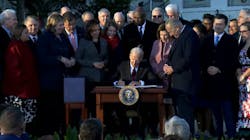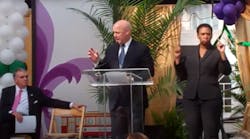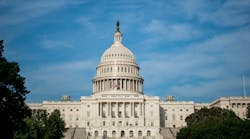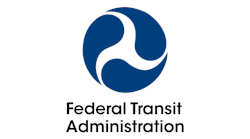Done deal: President Biden signs $1.2 trillion Bipartisan Infrastructure Deal into law
Negotiations have wrapped, votes have been counted and President Joe Biden has signed his name to H.R. 3684, The Infrastructure Investment and Jobs Act, which the administration calls the Bipartisan Infrastructure Deal (BID). The $1.2 trillion bill will bring an infusion of investment to several industries.
The bill contains the largest federal investment in public transportation in the history of the United States and the largest investment in passenger rail since the creation of Amtrak. The funding will allow transit and passenger rail operators to create better service, reduce maintenance backlogs and build new projects that enhance mobility within communities throughout the nation.
“This law makes this the most significant investment in roads and bridges in the past 70 years. It makes the most significant investment in passenger rail in the past 50 years and in public transit ever,” President Joe Biden told a large crowd during the bill signing ceremony on Nov. 15. “What that means is you’re going to be safer and you’re going to get there faster and we’re going to have a whole hell of a lot…less pollution in the air.”
Administrator of the Federal Transit Administration (FTA) Nuria Fernandez, who spoke with Mass Transit just prior to the bill signing, says there is a lot of excitement surrounding the bill and the attention it has given to infrastructure investments, particularly the up to $108 billion provided to the transit industry over a five-year period.
“$108 billion, that’s going to allow us to do a lot of great things that we have not been able to do in large numbers,” said Administrator Fernandez. “This will allow us to get a head start and fast track very important programs [and] start to chip away at the $105 billion in [transit maintenance] backlogs.”
FTA says communities can expect to see their transit funding increase an average of 30 percent while the funding within the bill will reduce current maintenance backlogs by 15 percent. Shortly after the BID was signed, FTA released an outline of four key priorities that the legislation will advance; they include:
- Safety: Enhancing state safety oversight programs by strengthening rail inspection practices to protect transit workers and riders from injuries and ensure safe access to transit.
- Modernization: Reducing the state of good repair investment backlog by repairing and upgrading aging transit infrastructure and modernizing bus and rail fleets.
- Climate: Replacing thousands of transit vehicles, including buses and ferries, with cleaner, greener vehicles.
- Equity: Improving transit service for communities that have historically had more limited access to transit and provide for substantial upgrades to station accessibility.
Implementing the BID will be a monumental undertaking on its own. The Biden Administration announced a task force and infrastructure coordinator charged with overseeing the execution of the bill’s priorities.
FTA has been working behind the scenes for months preparing for the influx of funds. Administrator Fernandez explained the department handled an additional $69.5 billion during the past 12 to 14 months through the various relief funds and has started to think about how to handle the additional $90 billion provided by the BID. The short answer is the FTA will need resources in the form of additional staff, enhanced processes and other tools to deliver on the BID’s promise and potential.
“We have an implementation plan [that] identifies how we're going to be delivering on this legislative action, given that it's not only an increase in funds over five years, but it also introduces a series of new programs,” said Administrator Fernandez. “Our discretionary programs are going to increase from six to 10. We have four new program areas - the All Stations Accessibility Program, a new rail vehicle replacement grant, the electric and low emitting ferry pilot program and new ferry service for rural communities - that means that we're going to need to bring onboard people with different talents and skills, and also rely on our existing team members to start to move into some of the areas that they may have not been responsible directly for, but they know that leveraging the experience is what's really going to help us.”
Oversight will also be an important component of delivering this legislation.
“We have all been entrusted. We have a fiduciary responsibility to ensure that the taxpayer salaries are spent at the intent to spend those dollars by Congress in the laws that they have enacted. The Federal Transit Administration has for many decades instituted a series of oversight programs that will continue and it's going to be enhanced in addition to our safety oversight to ensure that not only are the projects delivered, but as they're being operated, that it's done so in a safe manner,” said Administrator Fernandez. “We’re ready.”
The FTA is coordinating with its 10 regional offices and is preparing a series of communication efforts for the industry that will include fact sheets and webinars.
“As this money is going to require us to have more hands-on deck, we clearly expect that the industry is going to have to also resource itself to administer and deliver on the programs and to start to create opportunities to increase the work force, particularly around the delivery of the essential services that is hiring operators and maintenance personnel,” said Administrator Fernandez.
Additional information on the BID will be updated on FTA’s website, transit.dot.gov/BID.
Key funding levels and programmatic changes for public transportation in the BID over a five-year period (Fiscal Years 2022 to 2026) include:
- Increased funding for FTA formula and competitive grant programs for America’s communities, including:
- $33.5 billion for the Urbanized Area Formula Program to support transit operations in 500 communities across the country.
- $23.1 billion for the State of Good Repair program to assist in financing capital projects to maintain public transit systems.
- $5.6 billion in Low or No Emission Vehicle Competitive Grants to support the transition of transit vehicles to low or zero emission technologies.
- $5.1 billion in Buses and Bus Facilities formula and competitive grants.
- $4.6 billion for Rural Area Formula Grants to support transit investments and operations in rural areas communities, including $229 million for Public Transportation on Indian Reservations formula and competitive grants.
- $2.2 billion for the Enhanced Mobility of Seniors and Individuals with Disabilities program.
- $3.9 billion for additional Urbanized and Rural Formula Program assistance through the Growing States and High-Density States formulas.
- $966.4 million to support Metropolitan and Statewide Planning programs.
- Up to $23 billion for the Capital Investment Grants (CIG) Program, with $8 billion guaranteed to invest in new high-capacity transit projects that communities choose to build.
- Four new competitive grant programs, including a guaranteed:
- $1.75 billion for an All Stations Accessibility Program to reduce the number of legacy rail transit stations that remain inaccessible to individuals with disabilities.
- $1.5 billion for Rail Vehicle Replacement Grants to replace railcars that are past their useful life and improve reliability, safety and accessibility for transit passengers.
- $1 billion for Ferry Service for Rural Communities to improve access and mobility in areas where ferry service is a critical link for communities.
- $250 million for an Electric or Low-Emitting Ferry pilot program to support the transition of passenger ferries to low- or zero-emission technologies.
- $193 million for transit research activities and $62 million for technical assistance and workforce development activities.
Source: Federal Transit Administration

Mischa Wanek-Libman | Group Editorial Director
Mischa Wanek-Libman is director of communications with Transdev North America. She has more than 20 years of experience working in the transportation industry covering construction projects, engineering challenges, transit and rail operations and best practices.
Wanek-Libman has held top editorial positions at freight rail and public transportation business-to-business publications including as editor-in-chief and editorial director of Mass Transit from 2018-2024. She has been recognized for editorial excellence through her individual work, as well as for collaborative content.
She is an active member of the American Public Transportation Association's Marketing and Communications Committee and served 14 years as a Board Observer on the National Railroad Construction and Maintenance Association (NRC) Board of Directors.
She is a graduate of Drake University in Des Moines, Iowa, where she earned a Bachelor of Arts degree in Journalism and Mass Communication.





